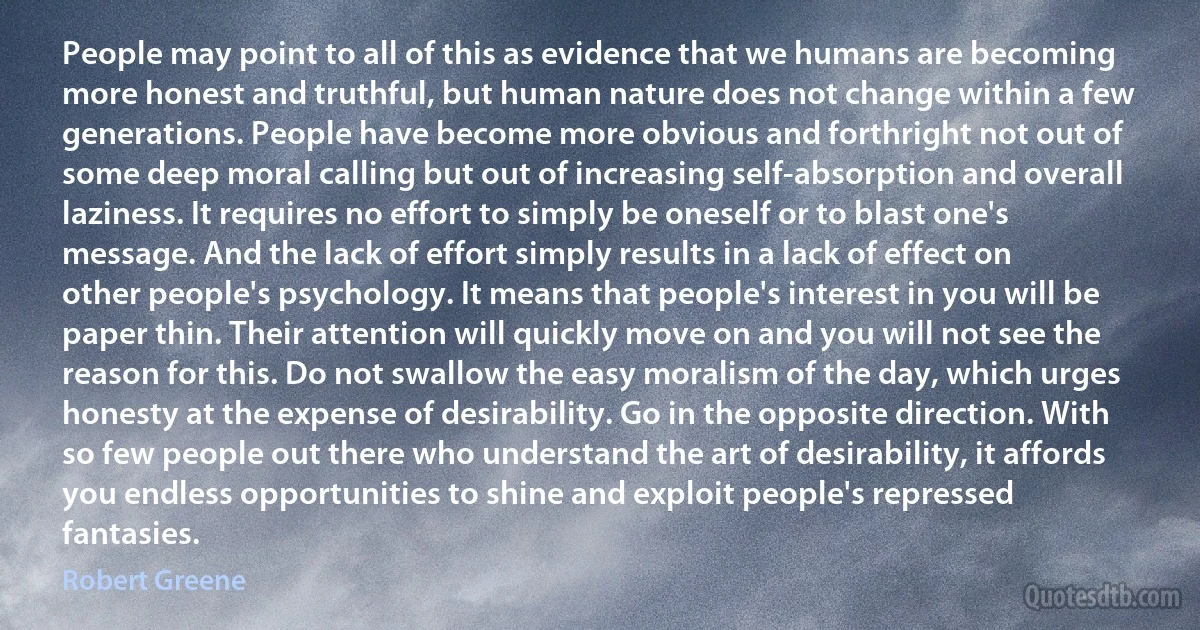
People may point to all of this as evidence that we humans are becoming more honest and truthful, but human nature does not change within a few generations. People have become more obvious and forthright not out of some deep moral calling but out of increasing self-absorption and overall laziness. It requires no effort to simply be oneself or to blast one's message. And the lack of effort simply results in a lack of effect on other people's psychology. It means that people's interest in you will be paper thin. Their attention will quickly move on and you will not see the reason for this. Do not swallow the easy moralism of the day, which urges honesty at the expense of desirability. Go in the opposite direction. With so few people out there who understand the art of desirability, it affords you endless opportunities to shine and exploit people's repressed fantasies.
Robert GreeneRelated topics
art attention becoming calling change day deep desirability direction easy effort expense few forthright honesty human increasing interest lack laziness moralism move nature overall paper people point psychology reason see shine swallow thin means self-absorptionRelated quotes
We must be prepared to accept the will of God. The Lord permits all sorts of things to happen to us contrary to our will, for if we always have it our way, we will not be prepared for the Kingdom of Heaven. Neither heaven nor earth will receive those who are self-willed.
God has a Divine plan for each one of us, and we must submit to His plan. We must accept life as it is given to us, without asking, "Why me?” We must know that nothing on earth or in heaven ever happens without the will of God or His permission. We must not become too engrossed with our hardships but concentrate on preserving our inner peace.
Even when we are praying for something, we are trying to force our will instead of accepting God's. All hardships and sorrows that God sends us are necessary for us, but we do not understand this when we are young. When we are older, then we understand that this is the way God shows His love for us.

Tadej of Vitovnica
The pretty game of calling on the children of the audience of "Peter Pan" to declare their faith in fairies seemed to me disastrous-a game of men and women at the expense of children, a cumbersome frolic at best and an artificial, a tyrannous use of the adult sense of sentimental humour against the helpless. I could with better conscience use my superior physical strength upon them than exploit them for love of my own condescension. (And yet Sir J. Barrie has written the most adorable "pretending" story ever written about a child.)No, children love a fairy story not because they think it true, but because they think it untrue, and because it makes no fraudulent appeal to their excellent good sense. That sense they are delighted to put aside while they "pretend." That is their own word.[...] "Let's pretend," not "Let's believe."

Alice Meynell
Anxiety, the next gumption trap, is sort of the opposite of ego. You're so sure you'll do everything wrong you're afraid to do anything at all. Often this, rather than "laziness," is the real reason you find it hard to get started. This gumption trap of anxiety, which results from over-motivation, can lead to all kinds of errors of excessive fussiness. You fix things that don't need fixing, and chase after imaginary ailments. You jump to wild conclusions and build all kinds of errors into the machine because of your own nervousness. These errors, when made, tend to confirm your original underestimation of yourself. This leads to more errors, which lead to more underestimation, in a self-stoking cycle. The best way to break this cycle, I think, is to work out your anxieties on paper. Read every book and magazine you can on the subject. Your anxiety makes this easy and the more you read the more you calm down.

Robert M. Pirsig
It should be clear by now that there are people who can, in fact, be reasonably considered experts; that it is rational to rely, within limits, on ex pert opinion; and that it is possible, by exercising relatively simple criteria, to gain insight into whether a particular expert is reliable or not. It is also true that experts, of course, do make mistakes, and that even the agreement of a large majority of experts in a field does not guarantee that they got it right. That's the nature of scientific truth, as we have seen throughout this book: it is tentative, because it is the result of a human endeavor that is limited both by the type and amount of available evidence and by humans' finite mental powers and emotional reactions. But the examples above show how you can, with a little bit of practice, tell science from bunk!

Massimo Pigliucci
There as elsewhere a cruel universe combined to crush a child. As though three or four vigorous brothers and sisters, with the best will, were not enough to crush any child, every one else conspired towards an education which he hated. From cradle to grave this problem of running order through chaos, direction through space, discipline through freedom, unity through multiplicity, has always been, and must always be, the task of education, as it is the moral of religion, philosophy, science, art, politics, and economy; but a boy's will is his life, and he dies when it is broken, as the colt dies in harness, taking a new nature in becoming tame. Rarely has the boy felt kindly towards his tamers. Between him and his master has always been war. Henry Adams never knew a boy of his generation to like a master, and the task of remaining on friendly terms with one's own family, in such a relation, was never easy.

Henry Adams
